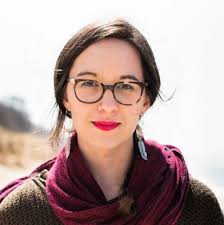Still seeking “something”? What now?

Question & Answer
Q: By Glenda
So, I have come to a point in my life where I no longer have a belief in a higher power. I was raised Southern Baptist and radiated to Methodist as an adult. After reading several of Dr. Spong’s books and essays I feel that what I had come to suspect is now true. Now I am lost, its as if there is not a Santa Claus. No being to look after me or my loved ones and perhaps no afterlife either. It’s not as if I am crushed but is it weird that I am still seeking “something”? What now? On the other hand, there is relief that there is not a God that only favors some, all the contradicting rhetoric in the Bible now doesn’t have to make sense to me. Please help.
A: By Kaitlin Curtice
I believe the person asking this question has come to a really important place in life, one that many people who grew up in fundamental religious spaces perhaps don’t get to. What happens when everything falls to the side and we are left with a sort of black hole where religion once was? I came to this in my late 20s and have been struggling with it ever since, while others come to this existential sort of crisis later in life.
For example, I have found it quite comforting that the universe is far expanded outside the walls of the Baptist churches I grew up in. Instead of a patriarchal, white God who controls everything and blesses only those he deems worthy, I am enveloped by Mystery that I cannot comprehend. That gives me room to breathe a little, to ask big questions, to wonder.
The advice I would give to the person asking this question is to let grief lead, at least for a little while. We must go through the process of letting go of the childhood “container,” as Richard Rohr calls it, to see what might be on the other side. Maybe on the other side it’s just more questions, but at least we know we aren’t alone. Ask what it means to be human, and that, if there isn’t an afterlife or a divine presence, what does it mean to still be a loving, kind human anyway, who honors others, human and non-human alike? We may not know what’s ahead of us, and perhaps we cannot make sense of the past, either. What we have is this exact moment, and we can be present to it. We can marvel at the way the leaves change colors and fall, or the way ice glistens in the sunlight.
We can become childlike again, without having to succumb to our childhood religious prisons. That, at least, is something. Allowing ourselves to grieve a religion that was ours for so long will give us room to ask what’s next, and to not shame ourselves, whatever the answer may be. If we become atheists, humanists, just generally spiritual, or followers of another religion, we do it because our humanness leads us there, and there is no shame in that. If there is a God/Divine Being/Great Mystery, I’d like to think they’d be okay with our grief, lack of clarity, and wobbly legs as we find our way through this life. The best part is, we aren’t alone in the search, because if we are human, we are made for questions, for life, for seeking, for being, and for that beloved childlikeness that claims us along the way, every day.
~ Kaitlin Curtice
About the Author
Kaitlin Curtice is a Native American Christian author and speaker. As an enrolled member of the Potawatomi Citizen Band and someone who has grown up in the Christian faith, Kaitlin writes on the intersection of Indigenous spirituality, faith in everyday life, and the church.
Her first book, Glory Happening: Finding the Divine in Everyday Places, was published with Paraclete Press in 2017. It is a series of fifty essays and prayers focusing on finding the sacred in everyday life. Kaitlin is currently working on her second book with Brazos Press, set to come out in 2020. It has been named by Publisher’s Weekly as a Religion and Spirituality book to watch for.
Kaitlin has contributed to OnBeing, Religion News Service, USA Today and Sojourners, among others, and she was interviewed for the New Yorker on colonization within Christian missions. In 2018 she was featured in a documentary with CBS called “Race, Religion and Resistance,” speaking on the dangers of colonized Christianity.
Kaitlin travels around the country speaking on faith and justice within the church as it relates to Indigenous peoples. She has been a featured speaker at Why Christian, Evolving Faith, Wild Goose Festival, The Festival of Faith and Writing, and more.

